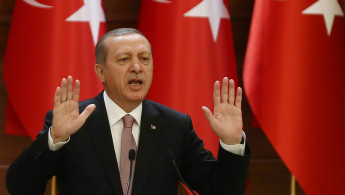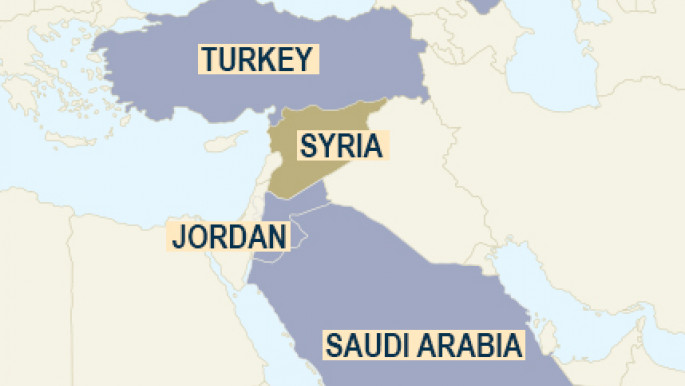Turkish President Recep Tayyip Erdogan insists his country's fight against extremists is 'undisputed' [Getty]
Turkey denied it had suspended airstrikes against Islamic State targets in Syria on Friday, after the downing of a Russian warplane on the Syrian border.
Turkish F-16 jets on Tuesday shot down a Russian warplane which Ankara said had breached its air space.
The Hurriyet newspaper said Turkey, a member of a US-led coalition fighting IS, had "temporarily" halted air raids against the group in Syria in order to avoid any further crises.
"Both sides agreed to act cautiously until they re-establish dialogue channels to reduce tensions," the paper said, citing security sources.
But a government official denied that strikes had been halted.
"At this time, Turkey remains fully committed to fighting ISIS as part of the international coalition," the official said, using another name for the IS group.
"Our policy remains unchanged and the claims, therefore, are inaccurate.
"Turkey's participation in coalition airstrikes is determined by ourselves and our allies alone depending on mutual assessments of military developments on the ground and logistical needs," the official added.
The downing of the plane sparked a crisis in relations between the two countries, with Russian President Vladimir Putin calling it a "stab in the back" and demanding an apology from the Turkish leadership.
Turkish President Recep Tayyip Erdogan has angrily rebuffed the Kremlin's demand for an apology and said Putin snubbed a phone call from him after the incident.
Erdogan on Friday said he wanted to meet with Putin on the margins of the upcoming climate summit in Paris.
Turkish Prime Minister Ahmet Davutoglu also sought to ease tensions with Moscow, calling for unity against the Islamic State group.
"While the measures to defend our territory will remain in place, Turkey will work with Russia and our allies to calm tensions," Davutoglu wrote in Friday's edition of The Times of London.
But Moscow announced on Friday it will be suspending visa-free travel with Turkey, starting from 1 January.
The decision comes as Russian Foreign Minister Sergey Lavrov said that Turkey has been reluctant to share information with Moscow about it citizens accused of involvement in terrorist activities.
'US knew flight path'
Putin has also claimed that Russia had given prior information to the United States of the flight path of the plane.
"The American side, which leads the coalition that Turkey belongs to, knew about the location and time of our planes' flights, and we were hit exactly there and at that time," Putin said at a joint press conference with French counterpart Francois Hollande in the Kremlin.
Putin dismissed as "rubbish" Turkey's claim that it would not have shot down the jet if it had known it was Russian.
The Russian leader also accused Turkey of buying oil from the Islamic State extremist group, whose financing heavily relies on the sale of energy resources.
Putin said there was "no doubt" that oil from "terrorist-controlled" territory in Syria was making its way across the border into Turkey.
"We see from the sky where these vehicles [carrying oil] are going," Putin said. "They are going to Turkey day and night."
"These barrels are not only carrying oil but also the blood of our citizens because with this money terrorists buy weapons and ammunition and then organise bloody attacks," he added.
Al-Araby al-Jadeed revealed in a special investigation on Thursday how oil from Islamic State-held territory in Iraq and Syria is smuggled by criminal gangs into Turkey, where it is repackaged and sold on, via Israel, to global markets.
Ankara denies collaborating with IS
Erdogan, on the other hand, denied that Turkey bought any oil from the Islamic State group, insisting his country's fight against the extremists was "undisputed".
"Shame on you. Those who claim we buy oil from [IS] are obliged to prove it. If not, you are a slanderer," Erdogan said, lashing out at the Russian charges.
"Our country's stance against [IS] has been clear since the very beginning," Erdogan said in a speech to local officials at his presidential palace in the Turkish capital.
"There is no question mark here. Nobody has the right to dispute our country's fight against [IS] or to incriminate us."
Turkey and Russia stand on opposing sides of the four-year Syrian conflict, with Ankara pushing for the ousting of President Bashar al-Assad by backing moderate opposition rebels.
Moscow is one of the few remaining allies of the Damascus regime.
Russia further enraged Turkey with the launch of its air campaign in Syria in September, accusing Moscow of focusing its fire on moderate rebels rather than IS extremists.
"Those who carry out a military campaign with the pretext of fighting [IS] are targeting anti-regime opponents," Erdogan said.
"You say you are fighting [IS]. Excuse me, but you are not fighting [IS]. You are killing our Turkmen kinsmen hand-in-hand with the regime in order to clear areas north of Latakia," he said, referring to the Syrian port city.
IS extremists have severely damaged Islam and the Muslims, he said, but added there was no difference between "an organisation's terror and state terror", referring to the Assad regime.
Erdogan called Russia a "strategic partner" which he said required solidarity rather than threats. "We are saddened by this," he said.
"There is no reason for us to target Russia with which we have multi-faceted and very strong ties, without any border violation," he noted, saying that disagreements with Moscow over the Syrian crisis and Ankara's activating its military rules of engagement were two separate things.
"If the same incursion happens today, Turkey will be obliged to retaliate."
Erdogan also hit back at Putin's charges that Turkey's leaders were encouraging the Islamisation of the country.
"How dare you speak like that," said Erdogan. "Ninety-nine percent of Turkey is Muslim."






 Follow the Middle East's top stories in English at The New Arab on Google News
Follow the Middle East's top stories in English at The New Arab on Google News
![Israeli forces ordered bombed Gaza's Jabalia, ordering residents to leave [Getty]](/sites/default/files/styles/image_330x185/public/2176418030.jpeg?h=a5f2f23a&itok=_YGZaP1z)

